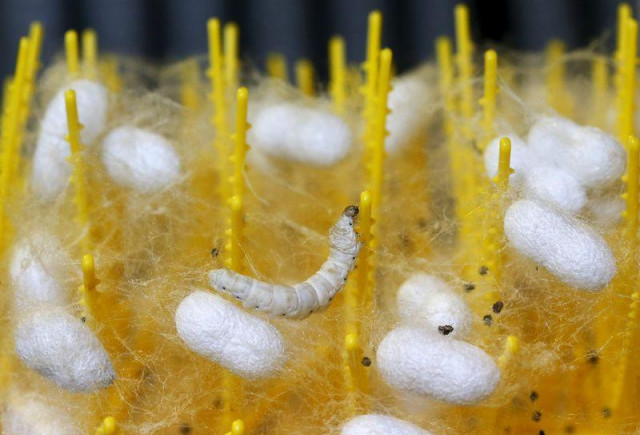Punjab’s raw silk harvest expected this week
A packet of seeds costs Rs2,000 and yields a profit of between Rs28,000 and Rs33,000

A Reuters file photo of silk worms
A household will approximately earn Rs30,000 to Rs35,000 from one packet of seed after successfully rearing the worms to retrieve raw silk from them.
Moreover, the waste that accumulates during the upbringing process could be used as a fish food or as fertilizer in crops. This waste, too, is sold at good prices in the local market.
A resident of Chichawatni, Mohammad Aslam, said he had received one pack of silkworms last year, but this year he got three packets. As a result, about 100,000 silkworms are being reared and the process is nearing completion.
If the silk is good, he said, he will earn an income of Rs100,000 to 125,000 this season.
Recently, the Punjab government had announced a programme to promote home-based silk producing business as an industry once the containment triggered by the coronavirus pandemic ends.
It is planned that special farms will be developed to nurture silkworms to increase the production of raw silk in the country.
Though several businesses have been affected negatively by the lockdown, those hosting silkworms have thrived. They are nurturing more silkworms than ever before as the family focuses on the business amid lockdown.
Deputy Director of Sericulture at the Forest, Wildlife and Fisheries Department Mohammad Farooq Bhatti said that because of the international flight ban the department did not receive seeds from China on time.
“We had only ordered 150 seed packets on March 15,” he told The Express Tribune, adding that the nurturing season of silkworm is passing by. It lies between February 15 and April 15, he stated.
The deputy director further revealed that the department has distributed at least 650 packets among nurturers, which he said, are ‘not enough’ to meet the overall production target for the current season.
“The seeds were distributed in various areas of Changa Manga, Chichawatni, Mitha Tawana, Sargodha, Mandi Bahauddin, Bahawalpur and Khanewal. Each pack of silk seeds is provided to businesses at a price of Rs2,000 by the government. One pack contains as many as 30,000 eggs.”
A silk moth lays about 4,000 eggs that are commonly known as seed. These eggs have to be incubated at a temperature of 30°C for four to five days for these to hatch. The hatched silkworms then feed on green leaves to produce a cocoon, which is processed to retrieve raw silk.
Speaking to The Express Tribune, Mohammad Ramzan, a contractor, said, “Silk cocoons are being sold at Changa Manga's local market at Rs750 to Rs850 per kilogramme.”
A woman named Perveen Bibi said, “This time we were given a packet of Chinese seeds and one of local seeds. “Chinese seeds are better,” she told The Express Tribune.
She explained that she cuts off mulberry leaves from outside the village to feed the worms. “We nurture them on the charpoy and now they have begun weaving cocoons.”
An official source revealed that only 33% of the overall production target of 30,000 kilogrammes of silk will be achieved in Punjab during the ongoing season.
The revenue from nurturing silkworms and making silk is likely to decrease by up to Rs25 million, he said, adding, “The sericulture department will try to achieve the offset amount in the upcoming silkworm nurturing season from September to November.”
In 2019, about 25,000kgs of silk was produced, which had brought in a revenue of Rs37 million. It is estimated that the demand for silk in Pakistan is around 500 metric tonnes.
Published in The Express Tribune, April 13th, 2020.


















COMMENTS
Comments are moderated and generally will be posted if they are on-topic and not abusive.
For more information, please see our Comments FAQ